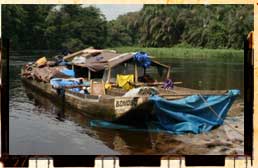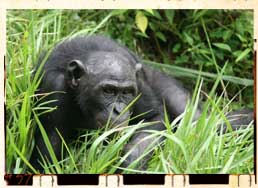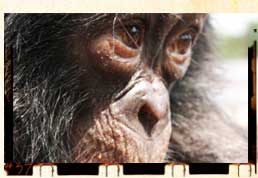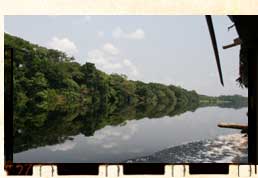KINSHASA, DRC - The Bonobo Conservation Initiative (BCI) joins the government of the Democratic Republic of the Congo (DRC) in announcing the official establishment of the Kokolopori Bonobo Reserve, a community-managed protected area which harbors one of the largest known wild populations of the endangered bonobo. The Kokolopori Bonobo Reserve is the pilot and model site for the Bonobo Peace Forest, a proposed constellation of community-based nature reserves supported by sustainable development.
Larger than the state of Rhode Island, the 1,847 mi2 (4,875 km2) rainforest reserve delivers essential ecosystem services to the world, including biodiversity protection and carbon sequestration, and benefits the local people through training, employment and community development programs. These include sustainable agriculture, a health clinic, aid for local schools, a women's microcredit program and the first institute of higher learning in the region, the Djolu Technical College for Rural Development and Conservation, established in tandem with the reserve.
"The Kokolopori Bonobo Reserve is a milestone for the protection of bonobos and their precious habitat in the Congo Basin," says Sally Jewell Coxe, president and co-founder of BCI. "What began as a grassroots, community initiative now exemplifies a new model for conservation that is proving to be effective and sustainable."
In danger of extinction, bonobos (Pan paniscus) were the last great ape to be discovered and are the least known great ape species. Found only in the DRC, bonobos inhabit the heart of Africa's Congo Basin-the world's second largest rainforest-which is increasingly threatened by industrial logging, commercial bushmeat hunting and agricultural encroachment. Bonobos are known for their peaceful, cooperative, matriarchal society, their remarkable intelligence and their sexual nature. Apart from humans, bonobos are the only primates known to have sex not just for procreation, but also for pleasure and conflict resolution, with members of either sex. These uncommon apes serve as a powerful flagship species, both for conservation and for peace.
The Kokolopori Bonobo Reserve is vital to research on and protection of bonobos, as it is one of the only sites where wild bonobos are habituated to human presence and can be viewed and studied on a daily basis. Albert Lotana Lokasola, president of the local NGO Vie Sauvage and the initiator of the project, says, "Since the time of our ancestors, our people, the Bongando, have traditionally protected and respected bonobos through taboos, legends and rituals celebrating bonobos as our closest relative and friend. The bonobo saved our ancestors from numerous dangers in the forest. We build on these traditions...We hope that many people will come and visit Kokolopori to enjoy and work with us to strengthen the reserve."










